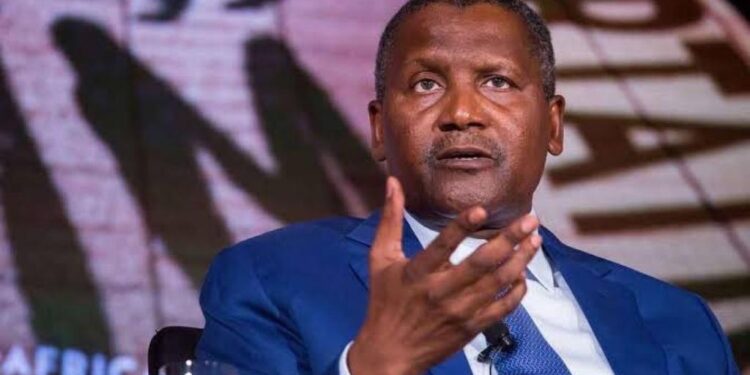I’m on a flight back to Lagos after a blissful four-day stay in Abuja, Nigeria’s capital city.
Throughout my stay in Abuja, Aliko Dangote’s worried look and greying visage have been haunting me.
In those days and the days before, he has moved from an activist billionaire to a seemingly frustrated one, and as I write, a billionaire that seems to have raised his hands in surrender with the screaming headlines I have seen, saying he is ready to sell his $20 billion project to the government-owned NNPC.
Nigerians, as usual, have taken sides, and I, in turn, have fired potshots at the fire.
In return, I received feedback from two of the main combatants on the other side – NNPC and independent marketers.
Before this, I have been in close talks with credible sources on the Dangote side, putting me in a strong position to look at the issues dispassionately without the emotions and angst that permeate both sides of the divide.
From the Dangote side – issues of crude supply, pricing of the same, distribution, and lack of institutional support, especially from the regulatory body that has come out quite unashamedly to make some very damaging statements.
On the other side, you have issues with Dangote allegedly wanting crude at discounted pricing but not committing to delivering at controlled prices.
Furthermore, there is the issue of the quality of the first product, diesel, which is giving concern to regulators.
Another issue is the strategic redirection of NNPC investment flows away from fuels to CNG and gas, which has led them to push more investments into that area and away from Dangote Refinery, making them not meet their obligations regarding the 20% stake initially signed, sealed, and delivered.
Now in the middle of all of these are the conspiracy theories of whom Dangote supported or did not support during the elections and also cries of monopoly and the rest, which for me are neither here nor there.
After hearing from both sides and from extremely credible sources on both sides, these are my thoughts.
The NUPRC has behaved very irresponsibly with its recent reported statements regarding, among other things, the licensing of the refinery.
It is also a reported statement on the quality of the products coming out of which I have seen a purported certificate of poor quality is also irresponsible as it may go a long way in shaking market confidence in the project.
I have also learned that rightly or wrongly, initial outputs on such projects have quality challenges, and this is industry-wide, not limited to Dangote.
If this is true, then the regulator should have been a little bit more restrained in the alleged statement.
Secondly, Dangote has already come out with evidence to debunk the licensing issue.
Now this aside, I have received firm assurances from my sources at the NNPC that it is not only in their interest but also in the interest of the nation for the giant refinery to succeed as a result of its very obvious quantifiable impact on the economy and on Nigerians.
They further assured me of their urge to protect all players in the space, including independent marketers who have investments in excess of N3 trillion.
On the Dangote side, they have shown considerable faith in Nigeria and as such must be supported despite all challenges.
Their refinery meets all globally accepted standards and has, in fact, begun to export to better-regulated climes.
They debunk the assertion very vigorously that their facility is not ready.
In fact, the accusation is that it has another 45% to get to its completion.
They also debunk the issue of trying to create a monopoly, citing the existence of Warri, Port Harcourt, and Kaduna Refineries with a motley crew of modular refineries licenses that litter the space.
They say that with their capacity, they should be fed with enough crude to enable them to reach maximum capacity with its attendant benefits to the economy.
The NNPC, on the other hand, further cites JV agreements reached years before the coming upstream of the refinery as a major hamper to the Dangote request.
They say that they are not in control of whatever the IOCs will do with their own share of crude in the JV, and as such, Dangote cannot cry to them.
They also say that most of these issues are regulatory, especially that of quality and distribution, which has nothing to do with them.
For me, as a Nigerian, my position is very clear.
Dangote Refinery is our only real ‘agbado’ in the fire. It is the only investment of its size that we as a nation have attracted ever and in the foreseeable future, and as such, all stakeholders must come together and put heads together to make it come on stream.
My suggestions to Dangote are to immediately, as he has said, list a certain percentage of its shares on the markets to ensure that Nigerians would also participate. This would push back harsh regulators who, from their utterances, see a personality instead of a bigger picture in all of these.
It should also seek to sell its shares to a major IOC whose home government would now be pulled into the fray and whose involvement would weaken its supply issues.
He should step down from the activism platform and seek mediatory and conciliatory actions targeted at the top.
The Dangote Group is one of Nigeria’s largest employers of labour, its biggest private taxpayer, a major player in infrastructural development, and a powerful forex revenue earner among others, and this is why all hands must be put on deck to ensure that these ‘teething’ problems are resolved in a transparent and professional manner.
Thanks
Duke of Shomolu















